The culture of Hong Kong, or Hongkongers culture, can best be described as a foundation that began with Lingnan's Cantonese culture and, to a much lesser extent, non-Cantonese branches of Han Chinese cultures. It later became influenced by British culture due to Britain's colonialism and subsequent obtention of the land, resulting in a culture characterised by both Cantonese-ness and British-ness. Moreover, Hong Kong also has indigenous people, whose cultures have been absorbed into modern day Hong Kong culture. As a result, after the 1997 transfer of sovereignty to the People's Republic of China, Hong Kong has continued to develop an identity of its own.

The Kowloon Walled City Park is a historical park in Kowloon City, Kowloon, Hong Kong. The Kowloon Walled City had been a military stronghold since 15th century due to its coastal location and was a centre of vice and crime until 1987. Under the agreement between the Hong Kong Government and the PRC, the Kowloon Walled City was demolished in the 1990s while the indigenous buildings and features were preserved for incorporation in the new park.
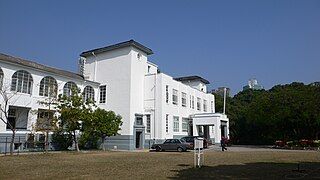
The Diocesan Boys' School (DBS) is an Anglican boys' school in Hong Kong, located at 131 Argyle Street, Mong Kok, Kowloon. Founded in 1869, it is one of the oldest and most prestigious secondary schools in the city. The school's mission is "to provide a liberal education based on Christian principles". Having run as a grant-aided school since it was founded, the school commenced operation in the Direct Subsidy Scheme in September 2003. It uses English as the medium of instruction.
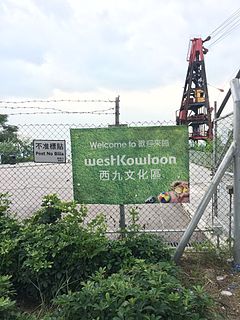
The West Kowloon Cultural District (WKCD) is a development project that aims to form an international-grade arts and culture hub on an area of land in West Kowloon, Hong Kong that was originally reclaimed in the 1990s as part of the Airport Core Programme. Located at the wedge-shaped waterfront reclaimed land west of Yau Ma Tei, the district will feature a new museum of visual culture, numerous theatres, concert halls and other performance venues under the management of the West Kowloon Cultural District Authority, which is directly financed by the government with an upfront endowment of HK$21.6 billion for construction and operation.
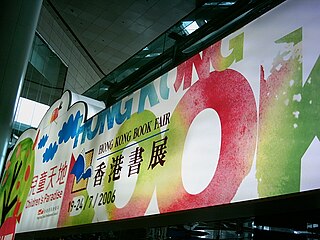
The Hong Kong Book Fair is a book fair organised by the Hong Kong Trade Development Council, held annually at the Hong Kong Convention and Exhibition Centre, selling and exhibiting books, printed matter, stationery, printing, compact discs and other multimedia publishing.
Clockenflap Music and Arts Festival, commonly abbreviated to "Clockenflap", is an annual music and arts festival held in Hong Kong. It incorporates international, regional and local live music, film, art installations, street, and kids' area. 60,000 people attended the 2015 event and was widely considered HK's marquee music event of the year.
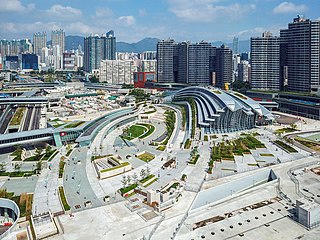
West Kowloon station, also known as Hong Kong West Kowloon and West Kowloon, is the terminus and only station of the Hong Kong section of the Guangzhou–Shenzhen–Hong Kong Express Rail Link (HSR). The station connects to the mainland China section through a dedicated tunnel and includes a Mainland Port Area where the laws of mainland China are enforced. It was constructed by MTR Corporation.
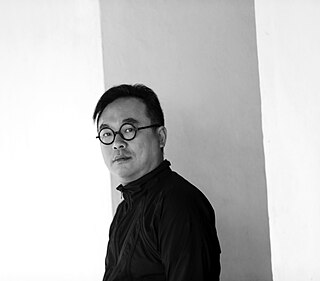
Mathias Woo Yan Wai joined the arts collective Zuni Icosahedron in 1988 and is now the Executive Director cum Co-Artistic Director of the group. Woo is renowned for his creative career in multimedia theatre as a scriptwriter, director, designer, producer as well as curator with a portfolio of more than 70 original theatre works, which are best known for their unique rendering of space and technology.

The reclamation of land from the ocean has long been used in mountainous Hong Kong to expand the limited supply of usable land with a total of around 60 square kilometres of land created by 1996. The first reclamations can be traced back to the early Western Han Dynasty, when beaches were turned into fields for salt production. Major land reclamation projects have been conducted since the mid-19th century.
Le French May is an annual arts festival organized by the Consulate General of France in Hong Kong & Macau to promote French art and culture. Events include visual arts, operas, classical and contemporary dance, music and theatre, circus as well as cinema. The festival also promotes French fashion and cuisine. The festival is usually held from April to June. A Picasso exhibition from May to July 2012 received 300,000 visitors.

The Jockey Club Creative Arts Centre is a multi-disciplinary arts centre in Shek Kip Mei, Hong Kong, housed in a converted nine-storey factory estate.
Tang Ying Chi is a Hong Kong based artist, curator, art administrator, art educator and editor. Tang is interested in a wide span of local issues including culture, identity and communication in the context of Hong Kong. She always seeks to explore these topics through her art works, from the identity issue of Hong Kong people during the pre- and post-handover period in 1990s to her recent research on the behaviour of people on the streets in Hong Kong.
Handicraft markets in Hong Kong provide a platform for artists and craftspeople to show or sell their original artistic works. They are growing in range and popularity, but remain restricted by the availability of venues.
The Hong Kong Food Festival is a food festival organised by the Hong Kong Asia Exhibition (Holdings) Limited. It is held annually at the Hong Kong Convention and Exhibition Centre, selling and promoting a variety kinds of food, drinks, snacks and many more. There are different zones for various kind of customers.

West Kowloon Bamboo Theatre is one of the flagship programmes of the West Kowloon Cultural District Authority (WKCDA). The West Kowloon Bamboo Theatre has been held since 2012 by the WKCDA which aims to promote Cantonese opera and the West Kowloon Cultural District (WKCD). Due to its popularity, the WKCDA continues to organise the West Kowloon Bamboo Theatre annually after 2012. Starting from 2013, apart from Cantonese opera, the theatre also provides performances of modern music and Chinese dance. There was a New Year Fair being provided as well.
Leung Mee Ping is a Hong Kong artist. Her works integrate elements and platforms of theatre, design, commercial space and social space, so as to extend performance or action through a research-based practice progressing to experimental interaction and integration. Those works can be defined as issue-based creativity. Leung is interested in researching for visual culture, space saving creativity, traditional handicraft, installation, public art and community art.
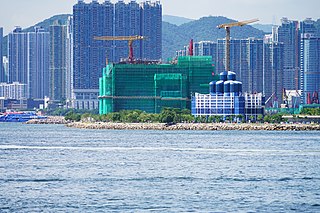
The Hong Kong Palace Museum is a planned museum exhibiting artefacts of Beijing's Palace Museum in Hong Kong's West Kowloon Cultural District (WKCD). Construction began in 2017, with the museum scheduled for completion by 1 July 2022.

GDJYB is a 4-piece female indie band based in Hong Kong. The concept of its name originates from the Chinese dish of steamed meatloaf with egg.
Canton Express (廣東快車) was an exhibition curated by Hou Hanru in 2003. The exhibition was part of Z.O.U. — Zone of Urgency at the 50th Venice Biennale and was exhibited in the Arsenale in Venice. The exhibition contained works from four artist groups and was the first time artists from the Pearl River Delta region of China participated in a major international event. It was a reflection on the rapid industrialization and urbanization of the region throughout the 1980s and 1990s.














